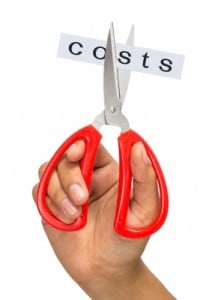… About your expenses that is.
If you are constantly finding yourself short on funds every other month, or if you have to keep dipping into your life savings just to keep the checkbook healthy, then something is wrong.
That was a harsh realization I had recently. Even after all the budgets and spreadsheets I’ve made, we were forecasting a huge deficit for the year. The only solution? It was time to get real about our household expenses.
Getting Real About Your Household Expenses:
What do I mean about that? Simple.
What will we realistically spend on household goods and other expenses this month? I don’t mean what I “wish” we’d spend. I don’t mean to simply use the maximum amount that we spent last year or last month. I mean what is realistic?
This sounds simple, but it is really important. Really, really important.
My greatest failure in budgeting: I was setting a limit without basis. It’s pretty easy to look at your fixed costs like your mortgage, car payment, utilities, and other things and get a snapshot of what you spend in a month. But those things are usually not the problem. The problem is usually buried somewhere in your variable expenses.
I always felt like raising the limit would show some kind of failure. Or perhaps it would lead to lifestyle creep. For example: If I raised our limit to $3,000, what guarantee do I have that our spending wouldn’t increase to $4,000? You get the idea.
But that was dumb. The whole point of setting an annual budget, adding up our income, and accessing our household expenses was so that I had confidence that I WOULDN’T have to dip into our savings or struggle to make ends meet throughout the year.
So by not getting real about our home expenses was doing myself and my family a great disservice. It was time to face our problems head on by seeing them for what they are and getting prepared.
The Past Can Help Reveal the Future:
When it comes to proper budgeting, using history should be your foundation. You know that you already know the answers. You could probably guess in the beginning of the month to within 10% of what the actual amount of expenses spent will be at the end of the month.
The first thing I did to attack this was to download all our credit card information into Excel. This was actually pretty easy because all three of my credit cards allow you to download all your transactions into an Excel ready file.
Once they were in there, I simply assigned a category to them and tallied them up for each month. Quickly I started to notice trends in our spending.
- Places where we spent too much.
- Places where we could probably cut back.
Outliers:
Another thing I had to do was identify something I’ll call “outliers”. These would be things within your household expenses that came up only once and will not likely ever come up again. Mandatory car insurance coverage you pay bi-annually doesn’t count, although you should compare and find cheaper rates every year anyways. I did and lowered my premiums by 38%.
However, a good example of an “outlier” was the crazy $2,000 auto expense we spent to fix a leak that shorted out the entire instrument panel in our SUV. Hopefully (fingers crossed) we won’t have that problem again.
Talking About It – The Most Critical Element:
Once I had all the information sorted out and in one place, there was one last thing I need to do:
- Talk to my wife about it.
When I asked my wife to sit down with me, it was just talking. There was no blaming. There was no telling each other what to do. It was plain and simple to see that we would be heading for trouble if we didn’t modify our spending, and so we both knew we had to do something about it.
My goal was simple:
- Talk about what our past expenses were
- Discuss what they should be going forward
And so that’s what we did. We looked at the monthly average for each category, talked about a few of the outliers, and then decided how much we actually should spend in a given month.
But the difference was more practical – these were numbers that we both set. Not just created by one person. When both people have a say in what these numbers should be, they both have a vested interest in making it work.
Going Forward:
Only the next six months will tell if we actually stick to our modified budget. But one thing is for sure: I feel much more confident in the numbers we came up with together than I did in the numbers I had in there previously. And that can only mean a better prepared budget and less chance for failure in the future.
If you haven’t already, I encourage you to do a deep dive into your monthly expenses. Knowing what they are may only be half the battle, but it definitely comes first in the sequence of events. If you don’t know you have a problem, then how can you treat it? Get your head out of the sand. I feel better knowing I did.
Readers – How realistic are you about your household expenses when it comes to your budget? Who else has really taken a deep dive and tried to understand what is eroding your savings every month? Any tips?
Related Posts:
1) A Financial Plan Sample – How Should I Budget My Money?
2) Learn How to Manage Money Better – Like a Large Company CFO
3) How to Budget – Download My Excel Budget Template
Image courtesy of FreeDigitalPhotos.net





I used to make very unrealistic budget amounts that I could never live up to. I was always frustrated and felt like a failure when I couldn’t meet my limits. Over the past year I have finally gotten budgeting right. I try to be more realistic with my budget categories and budgeting has went a lot smoother!
Exactly! Why do we always make them so unrealistic? When we set ourselves up for failure, we shouldn’t be so surprised when we do.
I think you have taken the first crucial step into serious budgeting. Understanding how you spend your income in the first place.It doesnt get more real than when you stare at your expenses and light-bulbs start going through your mind of the many areas you can probably cut back on! Communication is also key for a couple…its easier to achieve your financial goals when you are reading from the same page financially and presenting a united front to financial issues. You also tend to keep each other in check.
I think that keeping each other in check is perhaps one of the most important actions you can take. Once you’ve got the team all playing together, you’ll be able to take on anything.
I feel like I’m always struggling with my food budget. It seems crazy that I could spend over 300 on just me alone each month but I constantly go over. I think I really need to dive deep into that area and actually start writing out what I’m spending on each item to see if I can plug some leaks. I do buy healthy food and don’t eat out very much at all, but still! Anyway, that’s a goal of mine.
$300 per month for just yourself? You’d be sad to know that we spend about $300 per week!
You’ve got the right idea with the healthy food. I consider spending money on that to be an investment.
Sounds simple right? But how many actually do it? This was my big breakthrough – when I started tracking and setting realistic amounts rather than near hypothetical amounts we always blew through. Good luck!
Well if you ask me, when i had a full time job i hardly use to meet my set budgets though i use to plan the same and track the spending too but tough to meet them. But after transitioning to full time entrepreneur with a frugal mindset, i am actually able to meet or come closer to my set budget every month. Situation drives people at least in my case.
Interesting strategy. Its funny how once you’re solely in charge of your income you pay extra attention your finances.
Ugh, I periodically have to do the same thing. I have an idea of what I’d “like” our budget to be, but unfortunately it’s not always an accurate picture of what our budget “is” like. A lot of it is denial, like you mention. I don’t want to accept that my family actually spends as much as we actually do. But, before we can go about getting a better handle on our budget and expenses, we absolutely have to recognize what we’re doing and be honest about it.
Well said Justin. We’d do ourselves a lot of good to stop pretending what our finances should be and just recognize what we’re really doing. Only then can we try to scale them back or do something about them. Just setting an arbitrary upper limit is fooling yourself.
That is one thing that I have never had to do, dip into my savings account for household expenses. Wait, maybe that is because I never had savings before now, dang it! It can be hard to get a hold on the household expenditures, but now I have a healthy EF and money to spare each month.
Great post, good points about the necessity of speaking with your spouse to get on the same spending page. It is so important to talk about these things and not place blame!!
Thanks Jim and welcome to the site. Its funny that the blame game is our natural reaction to handling the situation. It solves nothing and avoids the very thing we’re trying to cure = why we spend so much every month.
Talking about it is best way to solve financial problems. Otherwise the right hand and left hand aren’t on the same page. I’m sure you will beat your goal if you are both aware and working toward it together.
Thanks Kim. All I know is that we won’t get there if we don’t work together, so getting on the same page was priority one!
Budgeting is really difficult, this article is a big help. Thanks
It was very honest of you to discuss this, MMD. I think this shows why tracking is really the key to successful budgeting. No matter how much we plan, it’s just too easy to fool ourselves that we’re on track. Without proper tracking, the numbers in most budgets (including mine) would probably be fiction.
Thanks SB. It was time to write a financial post where not everything was perfect. Nevertheless, this is probably one of the few times when looking backwards with your finances actually helps you to move forward. Time to stop fooling ourselves.
This is a great lesson, and one I still have to re-learn from time to time. The fact of the matter is that our budgets are not static. Our lives change, our desires change, costs change. Without regular re-evaluation, it’s very easy for things to get out of whack. We tend to be pretty lax with our monthly spending, as in we don’t set hard limits. But we track everything and look it over regularly to make sure our habits aren’t getting out of line. And the communication is a huge part of making it work.
I think we all need to get ourselves back on track from time to time. I’m just hoping that this deep dive reveals more than it ever has before, and that it will help us get better at budgeting.
I think budgeting is supposed to be little tight, being realistic shouldn’t be the guiding principle, but your goal should. If you’re trying to pay off your student loan in 5 years, you should have a monthly figure you’re shooting for and your budget should reflect around that. Can’t do everything.
Excellent post! I began tracking every penny I spend in an effort to set a more realistic budget. I’ve been doing so for the past 7+ years, and I can’t imagine a time when I’ll stop!
When my wife and i first did a budget we were down to the dollar accurate. Everything was cataloged and not a dollar was wasted. Once we got our debt under control we decided to loosen up and nowadays it is more of a guide – although we are still pretty good and I know if times got tough we could make the hard decisions and go back to a rock solid budget plan.
I’ve bad experience of saving household expenses. That’s why I give this responsibility to my wife. She is pretty good at saving. Pleased to learn some important budgeting information reading through this brilliant article. I hope above mentioned budget plan will be helpful for many others like me. Thanks.
I find this to be really important. If you don’t think you can handle your own expenses, then ask for help and put someone else in charge of them for you. This is a really important first step and a brave confession to make.
It would be great to refrain in becoming impulsive buyer. I’m guilty also about it. I tend to buy stuff that I don’t need for some reasons. Mostly, because of the promos are the reason why I buy stuff I don’t need. Before buying household needs, write everything in paper what we really need. By doing this, we have a guide and we will work on a certain budget.
I suspected that subject is difficult to be talked about it.
So 4 years ago when we start doing budgeting I did not set any limits, we just agreed with my partner to right down everything we spend on a Excel spread sheet.
That was a start, year on year basis you could already see where extra money go to. It is quite obvious and motivation is there – whether you want to save enough for trip of your dream, downpayment on a house or shave one year off towards financial independence…
You pegged the critical item: you must communicate and work with your spouse to eliminate/reduce the cost of discretionary items in your budget. You also might be able to reduce the cost of some of your necessary items, such as internet and phone, as well. I consider internet and phone necessary, even though we could live without them, unlike food. It is tough, however, to find a job without them.
Without your spouse, you don’t have a team and you don’t have a chance.
Isn’t it funny how a decade ago a phone was no big deal. Now all of us spend about $100 per month on a cell phone / data plan. What else will we be spending $100 on in the future?